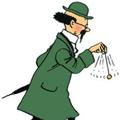Goodreads Review of How to Read Literature Like a Professor
4 stars
Foster's book is a classic. I remember chapters of it being assigned in high school, but I never made my way through the entire thing. He has an excellent sense of humor and makes understanding symbols comprehensible. I love that he never once imposes a reading of a text; instead, he opts to suggest possibilities about what things may mean given their prior use in the human Ur-story. Intertextuality gets plenty of coverage here as well.
A lot of stories mentioned here were familiar to me, and a lot were not, which allowed me to fill out my "to-read" list a bit more, while thinking about some stories that I want to go back to.
Nothing here should be too ground-breaking to heavy readers, but Foster's book is worth going back to from time to time.
Foster's book is a classic. I remember chapters of it being assigned in high school, but I never made my way through the entire thing. He has an excellent sense of humor and makes understanding symbols comprehensible. I love that he never once imposes a reading of a text; instead, he opts to suggest possibilities about what things may mean given their prior use in the human Ur-story. Intertextuality gets plenty of coverage here as well.
A lot of stories mentioned here were familiar to me, and a lot were not, which allowed me to fill out my "to-read" list a bit more, while thinking about some stories that I want to go back to.
Nothing here should be too ground-breaking to heavy readers, but Foster's book is worth going back to from time to time.

